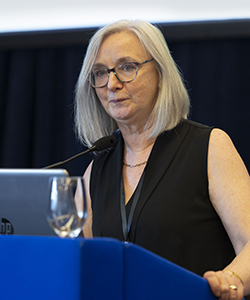As major public health reforms continue, Niamh Cahill examines the important work of senior medical officers in public and community health and how their role has altered since Covid-19
Many people outside the sphere of public and community health are perhaps unfamiliar with senior medical officers (SMOs) and what their role involves.
These doctors are also described as public health physicians and work for the HSE in the areas of public and community health.
Public health reforms and Covid-19 have had a huge impact on the workload and operational environment of SMOs in recent years.
SMOs have watched much-needed improvements take place around them while their role has been overlooked.
According to a spokesperson for the IMO, “it is essential that the career pathway, training opportunities, and terms and conditions” of SMOs are urgently reviewed.
If action is not taken, the Organisation says it will prove difficult to recruit doctors into the position. Of concern is the fact that SMOs are now among the lowest paid permanent HSE doctors in the country, according to staff pay scales. And without a career structure, what does the future hold for the position?
Who are SMOs and what do they do?
SMOs, also known as senior area medical officers (SAMOs), which is their official and correct title according to the IMO, provide frontline health protection in relation to statutorily notifiable infectious diseases, such as measles, tuberculosis, and Covid-19.
They engage in teaching, training, and the development of standards and policies within departments. Other activities can include environmental health surveillance and control, health promotion, and health service research.
But public health reform advocates believe the experience and talents of SMOs are significantly underutilised, with many having limited opportunity to engage in some of the roles listed above.
According to an IMO position paper on SMOs working in public health, dated February 2022, the majority are based within the six HSE departments of public health across the country.
A small number work within the National Immunisation Office and the Health Protection Surveillance Centre (HPSC).
SMOs have a broad variety of medical backgrounds and experience, according to the IMO. “As a prerequisite, all have at least six years’ clinical experience since qualification. All have postgraduate degrees to National Framework of Qualifications level 9/10. The majority are registered or are entitled to be registered on the register of medical specialties – mostly in general practice,” the position paper noted.
“The role of SAMOs in public health medicine is analogous to that of general practitioners in general medicine. SAMOs have a wide breadth of knowledge and experience to deal with many of the day-to-day clinical issues that arise. SAMOs, like their GP counterparts, develop extensive knowledge of the population they serve – such as individual patients, communities, vulnerable groups, schools/colleges, childcare facilities, residential care facilities, and workplaces. This intimate knowledge and insight adds value to the service they provide.”

In the past, SMOs worked almost exclusively alongside specialists in public health medicine and surveillance staff. Now they provide multidisciplinary team-based care together with nurses, public health consultants, surveillance staff, epidemiologists, and specialist registrars.
They report to the Director of Public Health or the consultant in public health medicine and provide an important role in supporting the work of consultant colleagues.
In order to carry out their health protection work effectively, they must develop extensive knowledge “beyond the scientific and medical”, explained the IMO paper.
Furthermore, they require a thorough understanding of the localities and region served by their department.
“They must have an in-depth knowledge of the population, geography, hospitals, vulnerable and minority groups, industries, businesses, farming, environmental issues, transport networks, schools, local authorities, sports facilities, and clubs, etc.”
SMOs provide unique supports and maintain the strength within a service, according to Dr Anne Dee, Chair of the IMO public health committee.
“They manage contact tracing, take the daily notifications, and follow up each case. They perform most of the liaising with contacts and/or cases. They are the clinical frontline of health protection,” she told the Medical Independent (MI).
SMO workforce
The clinical frontline of health protection suffered from significant underinvestment for decades. That was until the onset of Covid-19. Since then, the number of SMOs working in public health has increased.
According to HSE figures, there were 26 whole-time equivalent (WTE) SMOs in public health in January 2021.
Currently, there are 44 WTE SMOs with a further 5.2 WTE positions occupied by agency staff. This brings the total count to 49.2 WTEs.
In 2003, the agreed complement of public health SMOs nationally was 40 WTEs. Between 2003 and 2021, the population increased from 3.99 million to 5.01 million, or by 20 per cent, which means that, on a pro rata basis, the minimum WTE should now be adjusted to at least 48 WTE, according to the IMO position paper from 2022. In 2024, the population had risen to 5.2 million.
In April 2021, the Department of Health, the HSE, and IMO reached agreement on the implementation of a fundamentally reformed and strengthened model for public health service delivery. This model was in line with recommendations from the 2018 Crowe Horwath (now Crowe Ireland) report on the specialty.
The agreement heralded the establishment of the role of consultant in public health medicine, which has been widely welcomed. However, SMOs have been left behind in the reform process to date.
A total of 79 consultants are now in place with a further seven posts “in train”, according to a Department of Health spokesperson.
In 2019, the entire public health workforce numbered approximately 250 WTEs. The current workforce amounts to around 500 WTEs.
“Through this expansion, 242 additional WTE posts, including public health doctors, nurses, senior medical scientists, surveillance scientists, and support staff have now been recruited to public health in the HSE,” a Department spokesperson stated.
Planned enhancements to disease surveillance outlined by the Department in 2022 resulted in a further 62.5 WTE posts being added to the workforce in the HPSC, hospital sites, and the National Virus Reference Laboratory.
Community health
In community health – a separate working environment to that of public health – SMOs also provide valuable services.
These SMOs work mainly in child health, providing immunisations among other duties.
The IMO’s spokesperson estimated there are about 40 SMOs working in community health. While their roles differ from their public health colleagues, they operate under the same contract.
Public health reform advocates believe meaningful change in public health cannot occur without including community health in the process.
In the past community health and public health were more closely aligned. However, following the resolution of the public health doctor industrial action in June 2003, notifiable diseases operations transferred from community care to the departments of public health.
“In order to effect this change and to have adequate staffing, it was agreed to employ 40 WTE SAMOs within the departments of public health. The competition to fill these posts was confined to existing area medical officers and SAMOs in community care. This allowed for a migration of a staff, who were already experienced in the management of notifiable infectious diseases, into the departments of public health,” according to the IMO position paper.
The Organisation’s spokesperson told MI that, similar to public health, “there are significant issues for doctors working in community medicine.”
“The equalisation of the AMO [area medical officer] pay grade with SMO is welcome, but the SMO and PMO [principal medical officer] role remain unattractive and at a relative disadvantage to other medical roles.
“We face challenges in recruiting people into SMO and PMO roles due to the salary becoming uncompetitive, particularly as against GP opportunities, the lack of opportunities for career development, and a general undervaluing of the role. We are working across both public health and community medicine to address these issues.”
Dr Dee outlined that SMOs working in community medicine perform “a different job, but have the same contract”.
“Nothing can happen in the public health side without community medicine also being included,” she argued.
Salary and training
HSE pay scales for SMOs show that they can earn between €92,000 to €110,000 annually.
According to Dr Dee, SMOs “are possibly the lowest paid permanent HSE medical doctors in the public service now”.
“It is never going to be attractive if it is the lowest paid role,” she added.
“The SMO role is probably becoming less attractive as a job as the wages, terms and conditions of other doctors seem to be improving all around them and they seem to be getting left behind…. I think it has the potential be a very nice job and certainly if fully developed and properly remunerated and worked into the reform process it has the potential to be very attractive.”
Public health reform advocates believe that internal multidisciplinary core medical training, delivered formally, is required to enhance the position.
SMOs manage common infectious diseases, but could do more with extra training, such as manage routine water incidents or water treatment plant failures.
Underutilised
The IMO position paper has argued that SMOs “have been chronically underutilised in terms of practising to the top of their medical license”. This underutilisation represents “bad value to the State”, according to the paper. In the intervening years this position has not changed.
In recent decades, the workload of SMOS has “ballooned” due to new diseases, increased diagnostic tests, improved technologies in disease detection, and greater patient expectations.
This has resulted in a rise in the data detail required for surveillance purposes, with greater review and revision required of this data.
SMOs are often burdened with non-medical, office-related tasks, largely due to insufficient clerical support.
Dr Dee believes that SMOs have been “historically undervalued”.
“With recent reform, the focus was on getting the consultant contract for the specialists, and SMOs would have perhaps felt left behind in all of it,” she said.
“There is definitely potential to develop the role [of SMO] to a higher level and to use the skills of those very experienced doctors to better effect.”
The lack of electronic case management software for the management of notifiable infectious diseases places a considerable demand on the workload of SMOs, the IMO has argued.
A tender was recently awarded to establish an outbreak case and incident management IT system with implementation due to commence early next year.
Covid-19 impact
The impact of Covid-19 on public health services in Ireland has been immense. When the pandemic began the service, already struggling from a lack of investment and support, came under significant pressure.
SMOs played a crucial role in ensuring that the service continued to function.
According to public health doctors, they remain busier than ever due to a greater awareness of public health services, which has resulted in more demand being placed on them with higher expectations.
The Department stated it recognised the pressures placed on public health staff during the pandemic.
“The Department of Health recognises that the public health workforce was at the forefront of the response to the Covid-19 pandemic. Years of under-investment in this area were exposed and this underlined the need for significant restructuring, modernisation and investment.
“Challenges such as those presented by the Covid-19 pandemic highlighted the threat to population health posed by novel infectious agents and the critical national importance of a public health function and workforce sufficient to provide a robust, resilient, and responsive public health response.”
During the Covid-19 era, new staff were redeployed to public health and some stayed as part of the new public health model. More nurses were introduced to the service, along with clerical and administrative staff.
Complexities
Doctors working in the area admit that reforms have made the SMO role more attractive to young doctors seeking a career in public health.
On the other hand, the lack of a career pathway, development within the role, and poor terms and conditions, are having a negative impact.
In addition, the working environment and team fabric have altered significantly following Covid-19.
Dr Dee argued that SMOs require a new contract, with input from the HSE, the RCPI, and the Faculty of Public Health Medicine, to examine training and role development.
“The IMO is pursuing all industrial relations mechanisms to improve the terms and conditions currently and they have secured an increase in the continuous medical education allowance from €1,500 to €2,750 per annum,” said Dr Dee.
“The HSE National Director for Public Health is also liaising with the IMO around training and career development, so there is a lot that could be done. They are hugely experienced and valuable doctors and they provide the frontline of health protection and they are absolutely essential for health protection to succeed.”
Dr Dee explained that for many years the position was viewed as stable and permanent. But because there is no basic specialist training in public health, doctors seeking experience in the specialty are pursuing the role as a pathway to achieving other positions.
“That begs the question: Should we be thinking about having basic specialist training within public health?” she asked.
“Young people are coming in and then moving on when they get onto the higher specialist training scheme… there would always have been some of that, people that were in specialist posts getting onto the training scheme, but it wouldn’t have been seen so much before as a conduit to that.
“There is more competition and more interest now as you can imagine because you can now go to consultant level in public health. There is more competition and interest in those posts and people are seeking to have the most experience possible at interview for the higher specialist training scheme.”
There is definitely potential to develop the role [of SMO] to a higher level and to use the skills of those very experienced doctors to better effect
Future
SMOs have cooperated with reform and deserve improved terms and conditions, a clear career pathway, and better training opportunities, Dr Dee said.
The IMO believes the role requires urgent review, as SMOs are “an essential part of public health teams”, stated an IMO spokesman.
“SMO retention, recruitment, and development of the role will be key to the optimal development and functioning of all domains of public health at regional and national level. SMOs bring a wide range of skills, qualification, and experience essential to ensure a dynamic workforce, with an emphasis on the multidisciplinary teamwork, as envisaged in public health reform.
“There has been welcome engagement with SMOs by the National Director of Public Health’s office in relation to training, and the IMO has secured an increase in the CME allowance for SMOs, but there remain substantial issues.”
The legacy of Covid-19 is a complex one. But what it has demonstrated is that the lack of a robust, well-resourced public health service could have far reaching consequences in the future.













Leave a Reply
You must be logged in to post a comment.